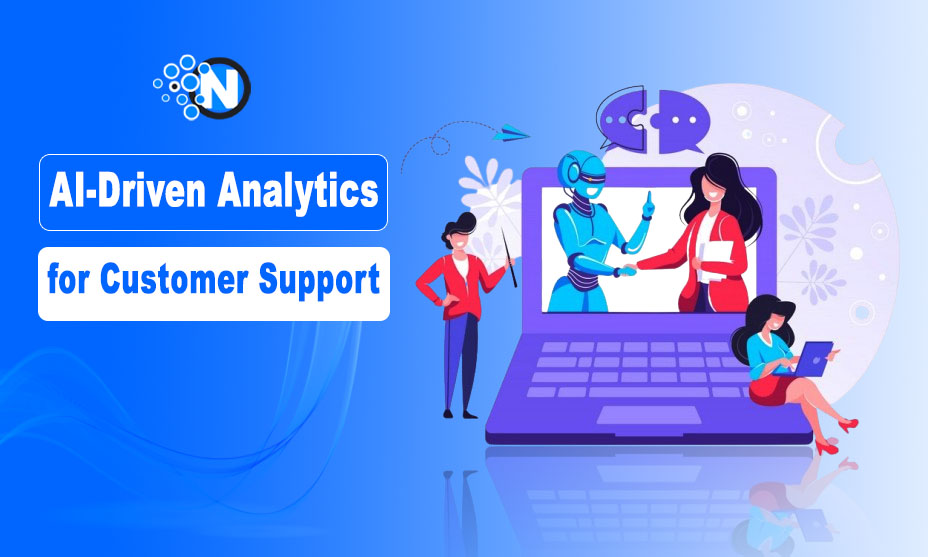AI-Driven Analytics for Unmatched Customer Support Improvement

Today, every company cares about delivering exceptional customer support. Artificial intelligence in business is a new reality, proving itself as a powerful tool in making customer operations more efficient and increasing the overall experience with them.
This article explores how AI-driven analytics helps companies move customer support to the next level. Let’s explore the value that personalized interactions bring to a business. We’ll also look at optimization of resources and strategies to increase customer retention.
Personalization of Customer Experience
As we turn to AI-driven analytics, we get a valuable tool that assists us in leveraging personalization of customer interactions. Using sophisticated algorithms, we can analyze extensive customer data, such as purchase history, browsing behavior, and past support interactions.
Business intelligence artificial intelligence can tailor responses and recommendations to each individual, which can be used in the personalization approach in every interaction with a customer. With such an approach, they will feel valued, which will in turn boost their loyalty level.
If a customer frequently purchases a specific type of product, AI in business analytics can help you determine their preferences and create algorithms with recommendations tailored to theirs needs. Used as a proactive approach, such tools can help anticipate customers’ needs. One of the examples of BI analytics can be found at https://cosupport.ai/cosupport-bi.
Real-Time Support and Decision-Making
Business intelligence and AI help companies in analyzing queries that we get from customers on a daily basis. Trained on previous interactions and communication with a client, the algorithms quickly suggest a solution, while at the same time assisting customer support agents with making decisions.
For example, if a customer comes to you with an issue they already had before (e.g. technical issue, troubleshooting, quality problem), AI can identify it and suggest a solution to a customer support agent. The process of managing tickets becomes straightforward and boosts resolution time.
Predictive Analytics for Anticipating Issues
How BI manages customer issues is seen from the data it provides, analyzing historical interactions. Depending on the metrics you wish to monitor, it can provide you with plenty of useful materials. With the right strategies, such data helps customer support teams take proactive measures in communication with customers.
For instance, you can go for a business intelligence automation process, where the algorithms can detect the delay in delivery and inform a customer about it. Another example can be notifications of the availability of favorite products, the choice is endless. With well-thought-out algorithms and an understanding of customer needs, companies can improve their service and gain customer satisfaction.
Automation of Routine Queries
Business intelligence and AI become our right hand in dealing with simple requests and managing routine tasks. As AI tools answer simple requests, customer support agents can contribute to strategic tasks.
Such type of automation boosts operations, reduces response time to customers’ inquiries, and decreases human errors in providing irrelevant information. At the same time, there is always a human customer support agent in the background who can intervene when needs come.
Data-Driven Insights for Workforce Management
AI in business analytics gives valuable insights in the areas of workload, time management, and peak hours. Taking into account all the interactions with the clients through different channels, BI tools can suggest optimal working hours, a number of needed agents, and overall information on the agents’ performance. This ensures that customer support teams are optimally staffed, during busy and quieter times.
With business intelligence automation, managers have better visibility of operations and the overall performance of the department. They can spot early enough if additional staff is needed and schedule the workload not to compromise the quality of operations.
Cost Efficiency and Operational Improvement
In addition to optimizing workforce management, business intelligence and AI help businesses identify areas where costs can be reduced without compromising service quality. Many processes in operations can be outdated, requiring manual, repetitive interventions.
Examples can be generating weekly or monthly reports, updating prices, etc. With BI analytics, managers can easily spot inefficient processes or identify areas for automation and improvement.
Some examples include moving some customers’ inquiries to a self-serve space and building algorithms to automate some of the processes. This not only reduces the demand for live agents but also empowers customers to find solutions independently.
Identifying At-Risk Customers
Business analytics plays a critical role in the analysis of business success. Taking into account customer behavior, engagement, and interaction history, AI algorithms can notify about customers who’re at risk of dropping off. This information is useful for building retention strategies and addressing their specific concerns.
For example, if BI detects that a customer has reduced their engagement with the brand or has expressed dissatisfaction in recent interactions, it can trigger an alert for the support team to intervene.
Feedback Analysis for Continuous Improvement
AI tools help companies gain valuable insights from interactions with customers, enabling continuous improvement in services. Such data also helps adjust support strategies, develop employee training, and implement new initiatives.
AI Insights for Strategic Decision-Making
The insights that companies get from BI analytics help them build correct strategies and align them with business goals. Besides, companies become closer to customers, understanding better their needs and behaviors. This creates unique proposals and personal offerings that meet customers’ expectations. Ultimately, good strategies will bring profitability and companies’ growth.
Summary

Photo by Anastasiia Ornarin on Unsplash
AI-driven analytics is transforming customer support. AI tools help businesses improve and come up with unique solutions, personalized services, and proactive problem-solving. The power of business intelligence, businesses optimize their operations while at the same time maintaining a high level of customer satisfaction. As a result, the clear strategies and the power of AI brings growth and success.




